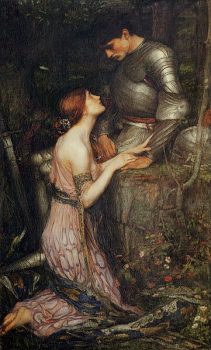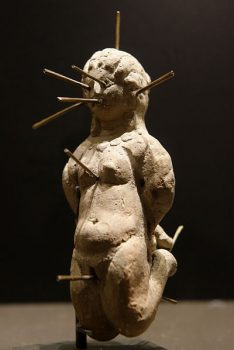What Spooked the Ancient Romans? Posted by Brittany Britanniae on Oct 20, 2016 in Roman culture, Uncategorized
Salvete Omnes! With Halloween just around the corner let us take a look at what the Ancient Romans were afraid might be under their beds… so to speak.
The Ancient Romans were a very suspicious people. They lived in constant watch in the world from signs from the gods and of the future, it would make sense that there were as many scary and spooky superstitions as there were celebrated and beloved rituals.

Capitoline Wolf, Capitoline Museums. Courtesy of Wikimedia Commons.
The Ancient Romans had their own werewolves; the verspilles. These were men who were said could shape-shift into wolves and hunt with them in the night.
Much like in almost all other cultures, the Ancient Romans were afraid of the malignant dead. The lemures were spirits that, according to Ovid, were vagrant, unsatiated, and possibly vengeful di manes or di parentes. These were the ancestral gods or spirits of the underworld. The dead were often considered in Ancient Rome and some would even leave offerings like the kind recreated below in their houses for spirits passing by:

LIBUM (SWEET CHEESECAKE)
Libum was a sacrificial cake sometimes offered to household spirits during Rome’s early history. Courtesy of Wikimedia Commons.
Lenures might look a lot like lemures, as in the primates, but this is not a coincidence. Linnaeus named the primate after the lemures of Ancient Rome because of their nocturnal habits and slow, creeping movements. The word lemures can be traced to the Proto-Indo-European stem “lem-“, which also appears in the name of the Greek monster Lamia.

“Lamia and the Soldier” by John William Waterhouse. (1905). Notice the snaeskins on her arm and waist. Lamia has attracted a lot of serpentine imagery, some even claiming that she was also given the lower body of a serpent, but Waterhouse depicts her here as a beautiful woman. Courtesy of Wikimedia Commons.
And there was Lamia. Another subject of Zeus’ affections and Hera’s jealousy, her children were killed for her involvement with Zeus. From then on, Lamia was driven to roam the world devouring children while made with grief. This must have been a terrifying myth for the children of Ancient Romans, and for any parents that might fear Lamia’s existence.

Nude female voodoo doll in kneeling position, bound and pierced with thirteen pins. Found in a terracotta vase with a lead tablet bearing a binding spell (katadesmos). Courtesy of Wikimedia Commons.
The Ancient Romans even had their own version of voodoo dolls. The small figures were depicted with their legs and arms puled back and were punctured with nails. This seems to also line up with a certain tension in Ancient Rome of the use of the supernatural or divine for malicious purposes, similar to a more modern fear of malicious witches.
It seems as though the Ancient Romans were afraid of very similar monsters we decorate our lawns and malls with around this time of year. For the historian or the Latin-enthusiast, these similarities might bring the Ancient Romans into a closer, more relatable light. But are these ancient fears only similar to our own or the origins of our own?

Build vocabulary, practice pronunciation, and more with Transparent Language Online. Available anytime, anywhere, on any device.
About the Author: Brittany Britanniae
Hello There! Please feel free to ask me anything about Latin Grammar, Syntax, or the Ancient World.




Comments:
Theresa:
Love the historical note.